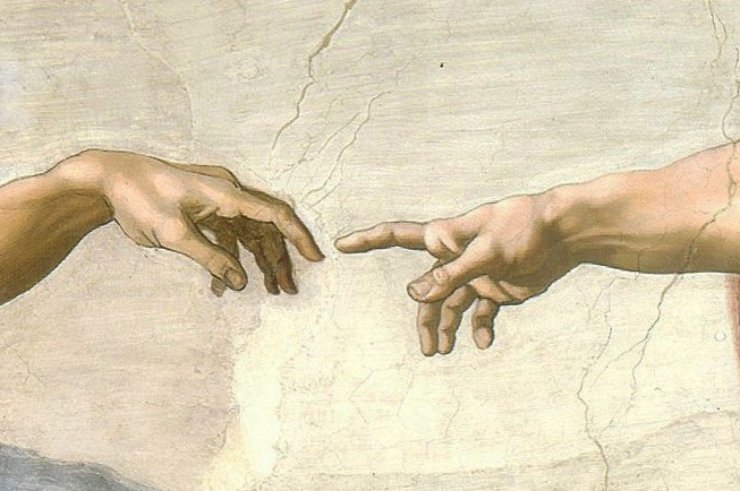Ideas are more precious than diamonds. The three most precious ideas I have ever discovered all concern the love of God.
None of them is original. But every one is revolutionary. None of them came from me. But all of them came to me with sudden force and fire: the “aha!” experience, the “eureka!” experience. They were all realizations, not just beliefs.
1. There Is Only “One Thing Necessary.”
The first happened when I was about six or seven, I think. It was the first important conscious discovery I ever made, and I don’t think I have ever had a more mature or wiser thought than that one. I remember to this day exactly where I was when it hit me: riding north on Haledon Avenue between Sixth and Seventh Streets in Paterson, New Jersey after Sunday morning church with my parents. Isn’t it remarkable how we remember exactly where we were when great events happen that change our lives?
I had learned some things about God and Jesus, about heaven, and about good and evil in church and Sunday school. Like most children at that age, I was a bit confused and overwhelmed by it all, especially by what this great being called God expected of me. I felt a little insecure, I guess, about not knowing and a little guilty about not doing everything that I was supposed to be doing. Then all of a sudden the sun shone through the fog. I saw the one thing necessary that made sense and order out of everything else.
I checked out my insight with my father, my most reliable authority. He was an elder in the church and (much more important) a good and wise man. “Dad, everything they teach us in church and Sunday school, all the stuff we’re supposed to learn from the Bible—it all comes down to only one thing, doesn’t it? I mean, if we only remember the one most important thing all the time, then all the other things will be O.K., right?”
He was rightly skeptical. “What one thing? There are a lot of things that are important.”
“I mean, I should just always ask what God wants me to do and then do it. That’s all, isn’t it?”
Wise men know when they’ve lost an argument. “You know, I think you’re right, son. That’s it.”
I had perceived—via God’s grace, not my own wit, surely—that since God is love, we must therefore love God and love whatever God loves. I now knew that if we turn to the divine conductor and follow his wise and loving baton—which is his will, his Word—then the music of our life will be a symphony.
2. The Way to Happiness Is Self-forgetful Love.
A second realization follows closely upon this one. That is, it follows logically. But it did not follow closely in time for me. Instead, it took half a lifetime to appreciate, through a million experiments, every one of which proved the same result: that the way to happiness is self-forgetful love and the way to unhappiness is self-regard, self-worry, and the search for personal happiness. Our happiness comes to us only when we do not seek for it. It comes to us when we seek others’ happiness instead.
It is an embarrassingly common lesson to take so long to learn, but most of us are incredibly slow learners here. We constantly try other ways, thinking that perhaps the happiness that did not come to us the last time through selfishness will do so next time. It never does. The truth is blindingly clear, but we are clearly blind.
The secret of love is not hidden, for “God is love,” and God is not hidden. God said through his prophet Isaiah: “I did not speak in secret, / in a land of darkness; / I did not say to the offspring of Jacob, / ‘Seek me in chaos.’ / I the LORD speak the truth, / I declare what is right” (Is 45:19).
Of course God’s secret plans, which we do not need to know, are hidden. And God’s infinite nature, which finite minds cannot know, is hidden. But the thing that we need to know, God does not hide from us. He offers it to us publicly and freely. Jesus invited prospective disciples to “come and see” (In 1:39). We are told by the apostle Paul to “test everything; hold fast what is good” (1 Thes 5:21).
This lesson is so well known that even a pagan like Buddha knew it profoundly, or at least its negative half. His “second noble truth” is that the source of all unhappiness and suffering (dukkha) is selfishness (tanha). All who teach the opposite—that selfishness is the way to happiness—are unhappy souls. “By their fruits you shall know them,” as Jesus tells us. Who are the happiest people on earth? People like Mother Teresa and her nuns who have nothing, give everything, and “rejoice in the Lord always” (Phil 4:4).
3. “In Everything God Works for Good with Those Who Love Him.”
A third shattering realization was that Romans 8:28 was literally true: “In everything God works for good with those who love him.” This is surely the most astonishing verse in the Bible, for it certainly doesn’t look as if all things work for good. What awful things our lives contain! But if God, the all-powerful Creator and Designer and Provider of our lives, is 100 percent love, then it necessarily follows, as the night the day, that everything in his world, from birth to death, from kisses to slaps, from candy to cancer, comes to us out of God’s active or permissive love.
It is incredibly simple and perfectly reasonable. It is only our adult complexity that makes it look murky. As G.K. Chesterton says, life is always complicated for someone without principles. Here is the shining simplicity: if God is total love, then everything he wills for me must come from his love and be for my good. For that what love is, the willing of the beloved’s good. And if this God of sheer love is also omnipotent and can do anything he wills, then it follows that all things must work together for my ultimate good.
Not necessarily for my immediate good, for short-range harm may be the necessary road to long-range good. And not necessarily for my apparent good, for appearances may be deceiving. Thus suffering does not seem good. But it can always work for my real and ultimate good. Even the bad things I and others do, though they do not come from God, are allowed by God because they are included in his plan. You can’t checkmate, corner, surprise, or beat him. “He’s got the whole world in his hands,” as the old gospel chorus tells us. And he’s got my whole life in his hands, too. He could take away any evil — natural, human, or demonic—like swatting a fly. He allows it only because it works out for our greater good in the end, just as it did with Job.
In fact, every atom in the universe moves exactly as it does only because omnipotent Love designed it so. Dante was right: it is “the love that moves the sun and all the stars.” This is not poetic fancy but sober, logical fact. Therefore, the most profound thing you can say really is this simple children’s grace for meals: “God is great and God is good; let us thank him for our food. Amen!” I had always believed in God’s love and God’s omnipotence. But once I put the two ideas together, saw the unavoidable logical conclusion (Rom 8:28), and applied this truth to my life, I could never again see the world the same way. If God is great (omnipotent) and God is good (loving), then everything that happens is our spiritual food; and we can and should thank him for it. Yet how often we fail to recognize and appreciate this simple but profound truth.
These are, I think, the three most profound ideas I have ever had. However, there is one idea that I have heard that I think is even more profound. It is Karl Barth’s answer to the questioner who asked him, “Professor Barth, you have written dozens of great books, and many of us think you are the greatest theologian in the world. Of all your many ideas, what is the most profound thought you have ever had?” Without a second’s hesitation, the great theologian replied, “Jesus loves me.”
Excerpted with permission of the author from The God Who Loves You, Ignatius Press.
“Creation of Adam” (detail) by Michelangelo [Public domain], via Wikimedia Commons














